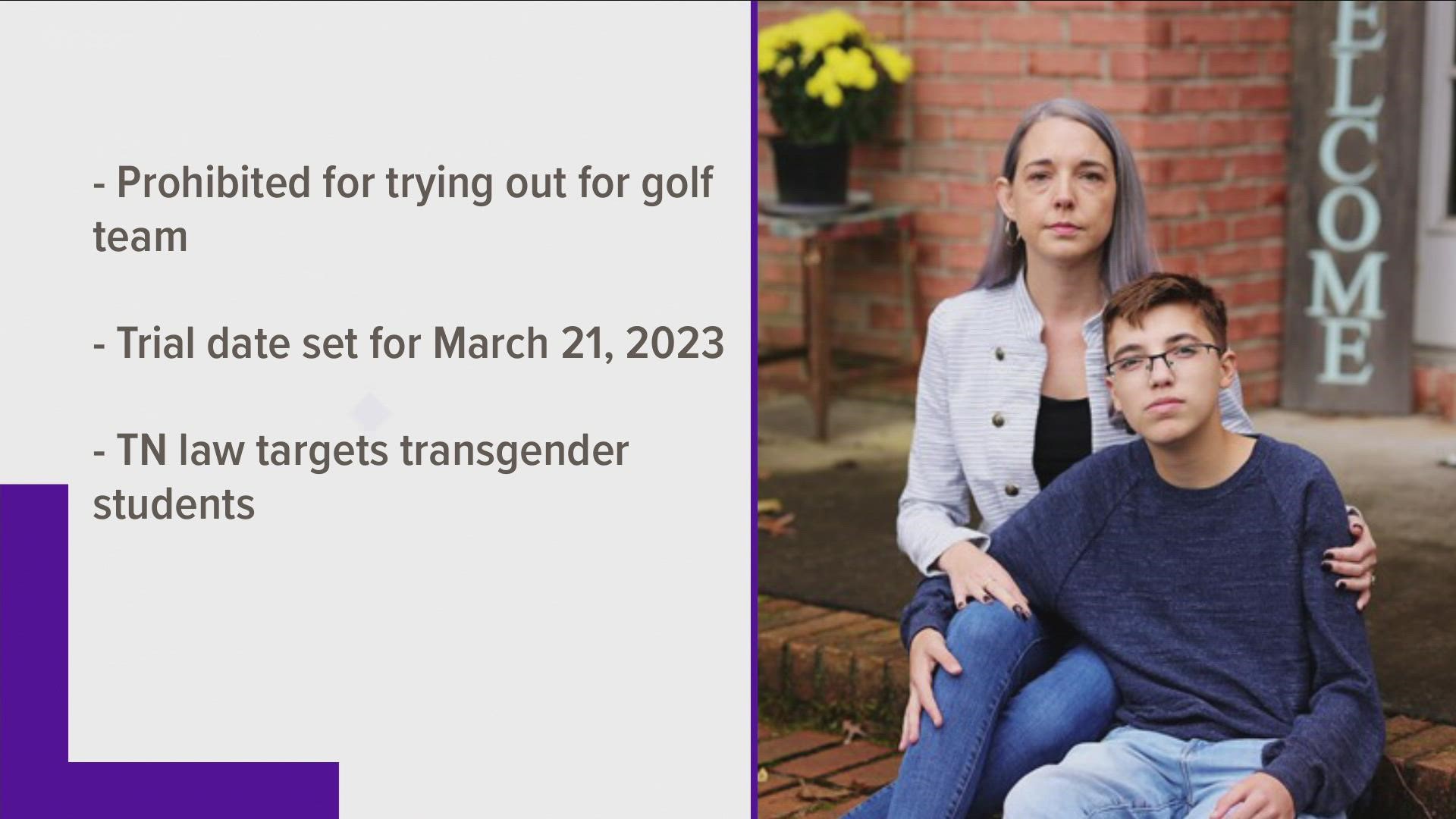NASHVILLE, Tenn. — Advocates filed a lawsuit challenging Tennessee's law that prevents transgender students from playing on athletics teams that align with their gender identity, saying lawmakers are illegally discriminating against students and violating the U.S. Constitution.
The trial for that lawsuit will be on March 21, 2023.
The lawsuit was filed on behalf of 14-year-old Luc Esquivel, a Farragut High School student, who said he was looking forward to trying out for the boys' golf team before SB 228 was signed into law. The law prevents transgender students from participating in sports teams that align with their gender identity.
"To have the legislature pass a law that singled out me and kids like me to keep us from being part of a team, that crushed me, it hurt very much," Esquivel said. "I just want to play, like any other kid.”
Suing the state isn't something Luc’s mother Shelley Esquivel necessarily she wanted to do. The lawsuit is a result of circumstance she said. "It breaks my heart that my kid loves golf, all he wants to do is play on a team with his peers," Esquivel said.


"He sees his sister participate in sports and sees the friendships and all the good benefits from that and you know, he has to miss out on that," said Shelly, his mother.
Luc worked largely alone in private lessons to build his skills so he would be good enough to make the team. The new law spoiled his dream of even trying out for the boys' team.


"The law was put into place and I think I'd go back and forth from being really angry to being really sad," she said. "I think that's really when it set in for him that just because of who he is, now he doesn't get to play on a team."
The plaintiffs are seeking to prevent the state from enforcing SB 228 or any other law that would prevent Esquivel from participating on a boys' school sports team in the state.
"The law amounts to a bare desire to harm a politically unpopular group, which is an impermissible government purpose and fails any level of equal protection scrutiny," the lawsuit said.
In the lawsuit, officials said that he does not have any possibility of playing on the team because of the law, regardless of his skill. They also say that it is stigmatizing to force him to play on the girl's team, just as it would be stigmatizing for a cisgender boy to be forced to be the only boy on a girl's team.
"Excluding a transgender boy from activities designated for boys, such as school sports, or requiring him to take part in single-sex activities for girls, is extremely harmful and can create serious health repercussions," the lawsuit said.
The lawsuit claims the law prevents transgender students from playing altogether since they would face psychological harm when playing on teams not aligning with their gender identity.
Since it bars transgender students from playing altogether, the lawsuit claims it also prevents them from benefiting from athletics. It says they can be forced to miss out on the social, educational, physical and emotional health benefits that athletics can bring.
"SB 228 contravenes prevailing standards adopted by athletic associations across the country and around the world," the lawsuit says. "Neither the National Collegiate Athletic Association (“NCAA”) nor the International Olympic Committee has adopted any sort of categorical bar on the participation of transgender athletes, and many transgender athletes do in fact participate in such elite athletic competition consistent with their gender identity."
The lawsuit goes on to say that the law is "a solution in search of a problem." Lawmakers could not identify an example of how transgender students' participation in sports limited opportunities for cisgender students during the legislative session, the lawsuit claimed.
"In fact, the sponsor was not aware of any transgender students participating in interscholastic sports at all in Tennessee," the lawsuit says. "It was part of a wave of legislation in Tennessee and across the country targeting transgender people for disapproval and exclusion from full participation in society."
Excluding Esquivel from Farragut High School's golf team does not protect the athletic opportunities and safety of cisgender girls, the lawsuit said.
Advocates claimed that the law can also violate protections from the Fourteenth Amendment since they say it discriminates on the basis of sex and transgender status.
Lambda Legal, the American Civil Liberties Union, and the ACLU of Tennessee filed the lawsuit.
Advocates and lawmakers also warned that the law could lead to an increase in assaults and suicides due to the increased marginalization of the LGBTQ+ community.
Middle Tennessee Republican Scott Cepicky introduced the law. He said that it was meant to maintain a competitive balance in athletics. Governor Bill Lee said that it would "preserve women's athletics and ensure fair competition."
The lawsuit argued Tennessee lawmakers' "clear disapproval of transgender people" was the actual motivation for the law.
Representative John Ragan, a co-sponsor of the bill, said in emails he thought transgender people were "evil" and sought to prevent more people from identifying as transgender. Representative Michele Carringer said that her religious upbringing also motivated her to support the law prevent Luc from playing golf. Senator Paul Rose also quoted The Bible in emails explaining his position supporting the law.
"Against the backdrop of this targeting of transgender people, SB 228 sends a clear message to transgender youth in Tennessee that, as far as the State of Tennessee is concerned, who they are is unacceptable and they do not belong," according to the lawsuit.


